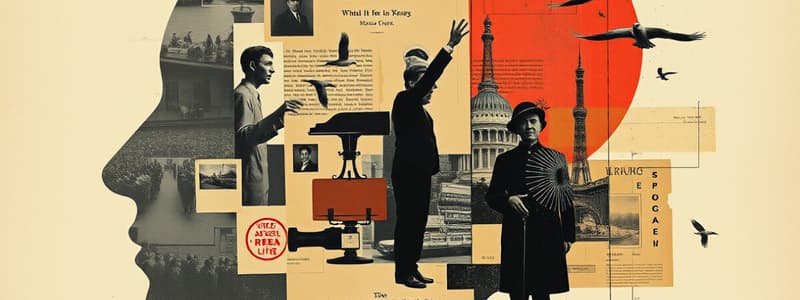Podcast
Questions and Answers
What is the Sociological Imagination?
What is the Sociological Imagination?
A way to think about individual lives and issues in relation to wider societal forces.
What is Social Solidarity?
What is Social Solidarity?
A concept focused on social relationships that hold society together.
Who were the pre-modern elites?
Who were the pre-modern elites?
Those who held power and wealth in feudal society.
Who were the pre-modern masses?
Who were the pre-modern masses?
What is Renaissance Humanism?
What is Renaissance Humanism?
What is referred to as the dark side of the Renaissance?
What is referred to as the dark side of the Renaissance?
Who is Nicolas Copernicus?
Who is Nicolas Copernicus?
Who was Jan Hus?
Who was Jan Hus?
Who is Martin Luther?
Who is Martin Luther?
What was the Protestant Reformation?
What was the Protestant Reformation?
Flashcards are hidden until you start studying
Study Notes
Sociological Concepts
- Sociological Imagination: A perspective to connect individual experiences to societal forces; illustrates how personal issues, like anorexia, stem from societal pressures, such as beauty standards propagated by media.
- Social Solidarity: Emile Durkheim's theme focusing on the bonds within society; explains roles and responsibilities that promote moral order.
- Mechanical Solidarity: Characterizes small, cohesive societies with shared values and low division of labor, often seen in religious, close-knit communities.
- Organic Solidarity: Reflects larger, more complex societies with high division of labor and specialized roles, leading to individualism.
Pre-modern Society
- Pre-modern Elites: Power holders in feudal societies, including nobles and those in religious and military roles, owning estates with attendance from serfs.
- Pre-modern Masses: Common people, mainly rural serfs who worked on noble lands; the third order of society focused on labor.
Renaissance and Its Influences
- Renaissance Humanism: Movement promoting eloquence and civic engagement through humanities studies; emphasized human dignity and rational thought separate from religious influence.
- The Dark Side of the Renaissance: Highlighted negative aspects, including religious conflicts and social turmoil like the German Peasants' War; also noted for economic changes leading to exploitation and cultural decimation, exemplified by Hernan Cortes.
Key Historical Figures
- Nicolas Copernicus: Renaissance scientist known for heliocentrism; challenged the geocentric view held by the church, positioning the sun at the solar system's center.
- Jan Hus: 15th-century Czech reformer whose teachings anticipated the Protestant Reformation; emphasized the church as a collective of believers rather than a hierarchical structure, leading to his martyrdom.
- Martin Luther: Initiated the Protestant Reformation with his 95 theses, critiquing church practices like indulgences; his beliefs included "sola fide" (faith alone) and "sola scriptura" (scripture alone), challenging Catholic authority.
Protestant Reformation
- Initiation: Started by influential figures like Martin Luther, John Calvin, and Huldrych Zwingli in 16th-century Europe; focused on theological critiques of Catholic practices.
- Key Critiques: Included opposition to the sale of indulgences and the authority of the Pope over spiritual matters; promoted scriptural basis for faith and individual relationship with God.
- Broader Motives: Alongside theological concerns, factors like nationalism, corruption in the Papacy, and Humanism's impact played significant roles in the movement's development.
Studying That Suits You
Use AI to generate personalized quizzes and flashcards to suit your learning preferences.




